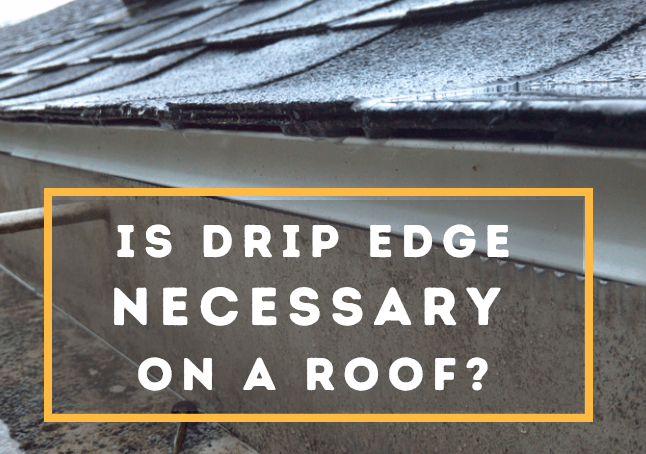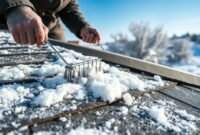While often overlooked, roofing details are crucial for maintaining a home’s integrity. Among these, the drip edge flashing plays a vital role. This essential roof component protects your home’s structure and acts as a barrier against potential damage. Recognized in building codes, drip edges are a key element in roof design and maintenance.
By effectively redirecting water away from vulnerable areas, such as the fascia and soffit, a drip edge acts as a first line of defense against water intrusion. Its presence can significantly extend the lifespan of your roof, preventing costly repairs and preserving the integrity of your home.
Is a Drip Edge Necessary on a Roof?
In roof maintenance, a drip edge plays a crucial role. Its necessity stems from the multiple functions it serves:

● Water Barrier
The drip edge flashing, a critical metal flashing installed at the edges of the roof’s perimeters, is an effective water barrier. It is a fundamental roof component that prevents drip edge water from seeping under the shingles, thus protecting the underlying wooden structures, especially the fascia board and roof deck, from water damage. Most building codes now require drip edges for this protective role.
● Water Flow Management
Besides a protective barrier, the drip edge is vital in managing water flow. It directs water into the gutters, preventing it from trickling down the sides of the house, which can cause cosmetic and structural damage over time.
● Protection against Pests
Another often overlooked advantage of drip edges is their role in pest control. By sealing off the space between the roof deck and fascia board, drip edges prevent small animals from entering and causing damage.
Estimating the Cost of Installing Drip Edge on an Existing Roof
Several variables come into play when determining the cost of installing a drip edge on an existing roof.
● Size and Complexity of Roof
The larger the roof, the more material and labor required, increasing the cost. The complexity of the roof design also plays a role. Roofs with more corners and edges will require more time and precision during installation, leading to higher costs.
● Material of Drip Edge
The cost can significantly vary based on the material of the drip edge. Common materials include aluminum ($1-$2 per linear foot), galvanized steel ($2-$3 per linear foot), and copper ($5-$10 per linear foot).
● Labor Costs
Labor costs vary depending on the region, the roofing professional’s expertise, and the job’s complexity. On average, homeowners might expect to pay between $45-$75 per hour for labor.
Roof Installation Without a Drip Edge: Is It Advisable?
Cutting costs in home improvement projects may be tempting, but omitting a drip edge during roof installation is inadvisable. Roofing contractors and building codes often emphasize the necessity of drip edges. Here are some compelling reasons why a drip edge is essential:
● Risk of Water Damage
A roof without a drip edge is left exposed to water intrusion, which can compromise the fascia and roof deck. This can eventually lead to significant structural damage, including rot and mold growth.
● Increased Repair Costs
The damage caused by water intrusion isn’t always immediately visible and can silently progress, leading to costly repairs or even necessitating a complete roof replacement. These costs can be exponentially higher than the initial expense of installing a drip edge.
Common Misconceptions about Drip Edges
Despite the benefits that drip edges provide, several misconceptions persist about their use:
● Gutters Are Sufficient
Some homeowners believe that gutters alone can protect the roof from water damage, overlooking the vital role drip edges play in directing the water into the gutters.
● Only Necessary in High Rainfall Areas
Others assume drip edges are only necessary for areas with heavy rainfall. However, a drip edge is essential in all climates to protect your home from wind-driven rain and snow and to maintain the integrity of your roof.
Read also: What is a Drip Edge on a Roof?
A drip edge may seem minor, but it protects your home from water damage. The initial cost of installing a drip edge outweighs its benefits, making it a wise investment for every homeowner.


